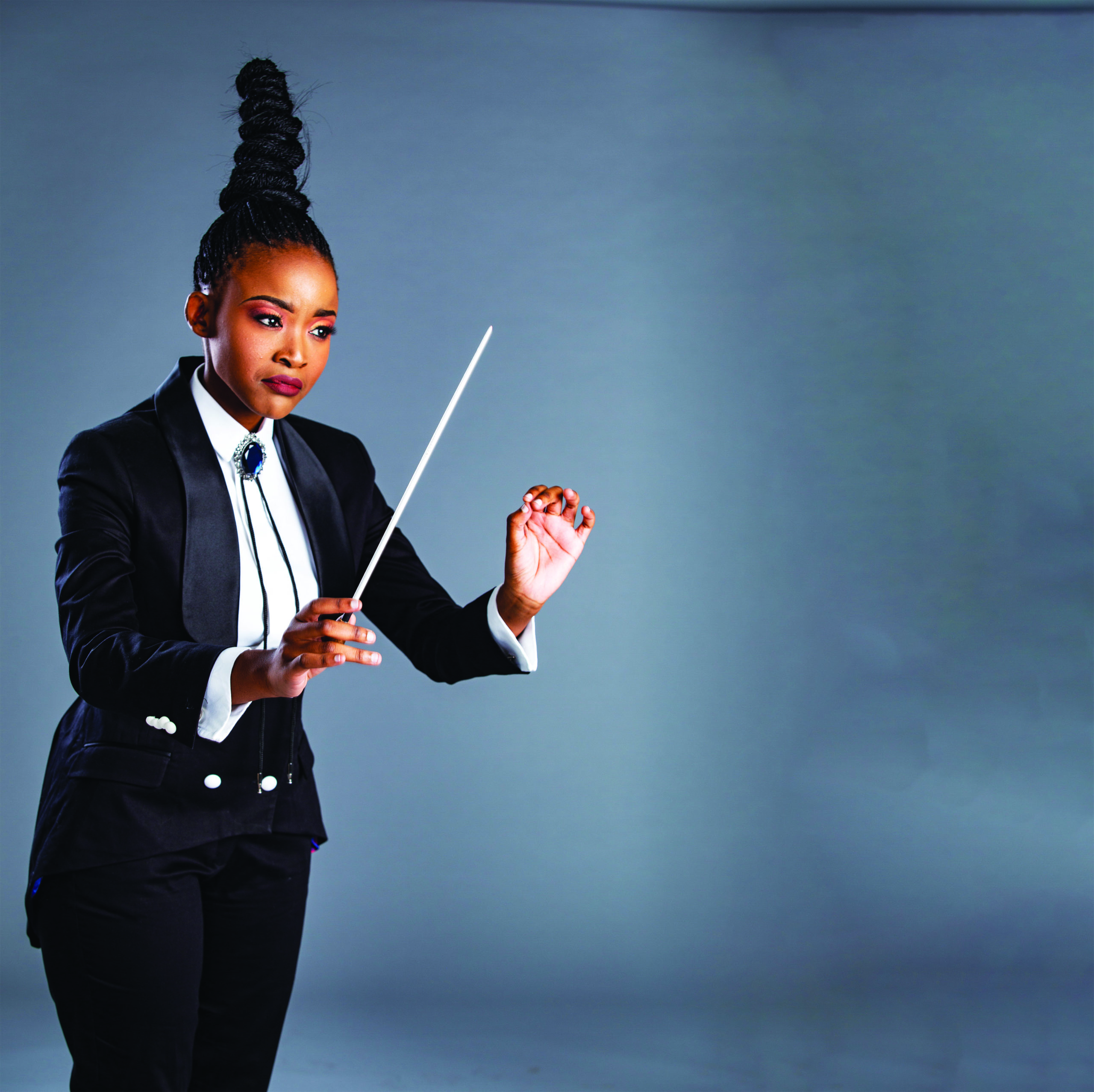Only 27, Ofentse Pitse owns and conducts an orchestra in South Africa, rewriting the soundtrack for the region’s abundant though overlooked musical talent. But the pandemic has made performing together a logistical conundrum.
IF IT REQUIRES 10,000 HOURS OF dedication to master an instrument, it takes someone of harmonic resolve to become the conductor of a 45-piece orchestra, and 30-member choir, by the age of 27. Ofentse Pitse is the owner of Anchored Sound, the Johannesburg-based, all-black phenomenon rewriting aspiration’s soundtrack for the region’s abundant but overlooked musical talent.
The first black South African woman to own and conduct an orchestra was playing the flugelhorn, a gift from an uncle, by the age of 12 (her grandfather was the trumpeter and jazz conductor Otto Pitse); her nascent talent and determination were nurtured by the Salvation Army band in her home town of Mabopane, Pretoria, the capital of South Africa.
“In the beginning, the dream was a silent dream,” she says. “I didn’t really share my ideas, I was just thinking of how far I wanted to go. I didn’t see enough representation in the brass band at church. I thought to myself, ‘hang on, I’ve not seen enough girls’! That was a leadership step.”
A formative experience at school then sparked a natural instinct for transgressive innovation.
“I remember one day just wanting to touch the piano in the music department,” she says. “And being told, ‘no, you can’t touch the piano’. That made me feel so small. My argument will always be that you have to
be what you want to see; you cannot fight a system if you are not willing to challenge it yourself.”
Out of this frustration, Anchored Sound was born, named after the Biblical metaphor of hope as the anchor of the soul. The choir and orchestra, supported by Pitse, with funds from her own architectural practice, perform everything from Sibelius to Vivaldi to Dvořák, with Pitse’s leadership in turn bolstered by mentorship from the University of Pretoria Symphony Orchestra conductor, Gerben Grooten.
“I told him that if we need to do the very hard pieces, we are going to do the very hard pieces,” she says. “So we do. It’s always a challenge, every single week. He always emphasizes the leadership required. How you stand, or how you enter a rehearsal space, influences how you are treated. Because being a woman, sometimes when they see me enter the space they think, ‘ah, what does she know’!”
The obstacles she faces are financial as well as cultural; funding is scarce and difficult to obtain. “Sometimes people see your pictures and you look like money, they hear interviews, you sound like money,” she says. “But there’s not one single person investing in Anchored Sound, the brand, or myself as a conductor. It’s challenging to keep the ship afloat. I learned early on that if you want something to happen, you cannot wait for the government, or whatever, because then I would complain for years without having anything done.”
Central to her role is her support for her members, many of whom lack the resources to purchase their own instruments or fulfil their own ambitions alone.
“I empower my members by first of all being great – or at least a good enough! – example,” she says. “So beyond just the musicianship, I always encourage them to study, even if it’s not music. Education
is the tool for opening up many doors mentally, not just in terms
of opportunities. In the beginning, I would help them with their registration at school, with their tuition, with their accommodation.
Whenever we book concerts, the funds go straight into their education. Most of them are very talented, but they come from homes that are disenfranchized.”
The pandemic has also made rehearsing and performing together a logistical conundrum that is difficult to solve for members from disadvantaged communities.
“Technology doesn’t come as second nature to some of us, so it has been difficult to facilitate how we go digital,” she says. “All the major orchestras have the infrastructure to have your good cameras, your good clip-on mics. For us, it’s very challenging, because you have players in remote areas, some in very small houses. If you ask them to record using their phone, you find in the other room there’s a baby sister making noise. So I’ve been looking at new ways of thinking as conductors, because we are so used to meeting up in spaces that are enclosed; how do we live with this new norm? How do we create a new world symphony?”
For Pitse, the unexplored musical frontier that emerges after the pandemic will be unapologetically, dynamically African.
“My second dream is to create an African orchestra, with African instruments like the marimba and the balafon (gourd- resonated xylophone),” she says. “Most musicians who play African instruments don’t know how to read music, so it would be such a spiritual exchange. These musicians know how to be guided by the spirit of music. And that’s the beauty of all things African – it really is the spirit! I’m eagerly excited to make that happen in the near future, to find out how the spirit of Africa can come alive within this new world of what an orchestra can be.”

–BY ALASTAIR HAGGER
